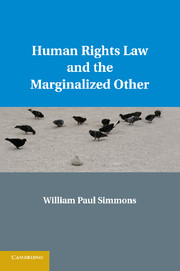Book contents
- Frontmatter
- Brief Contents
- Contents
- Preface
- Introduction
- Part I Deconstruction of Human Rights Law
- Part II Phenomenology of the Saturated Other
- Part III Human Rights of the Marginalized Other
- Conclusion Working with the Marginalized Other to Deconstruct and Reinvigorate Human Rights Law
- Bibliography
- Index
Introduction
Deconstruction, Concrete Universalisms, and Human Rights of the Other
Published online by Cambridge University Press: 07 October 2011
- Frontmatter
- Brief Contents
- Contents
- Preface
- Introduction
- Part I Deconstruction of Human Rights Law
- Part II Phenomenology of the Saturated Other
- Part III Human Rights of the Marginalized Other
- Conclusion Working with the Marginalized Other to Deconstruct and Reinvigorate Human Rights Law
- Bibliography
- Index
Summary
To call for a deconstruction of human rights law must seem both impudent and untimely. Impudent because deconstruction, having arrived uninvited and quite late to the human rights party, dares to undertake a criticism of human rights law’s very foundations; untimely because this critique comes at the very moment that human rights law is struggling to maintain its newly gained prominence in legal, academic, and policy circles against the onslaughts of interminable wars on terror and their concomitant ideologies of realpolitik. Just when human rights law appears in its most robust state, deconstruction has the nerve to call for its reinvigoration. How could human rights law require reinvigoration today?
Furthermore, deconstruction must appear to be an odd candidate to assist in the reinvigoration of human rights law when it, along with its fellow traveler postmodernism, are infamous for their obscurantism, for “producing a scholarship” that is “conceptual, arid, and removed from experience” (Blumenson 1996, 527). More substantively, they have been censured for their rejection of any type of values or universalism, leaving behind a morass of relativism. As feminist legal scholar Catharine MacKinnon challenges:
Can postmodernism hold the perpetrators of genocide accountable? If the subject is dead, and we are dealing with deeds without doers, how do we hold perpetrators accountable for what they perpetrate? Can the Serbian cultural defense for the extermination of Croats, Bosnian Muslims, and Kosovar Albanians be far behind? If we can have a multicultural defense for the current genocide, because that’s how the Serbs see it, why not a German cultural defense for the earlier one? Anti-Semitism was part of German culture. (2000, 706)
We are told, in the New York Times no less, that postmodernism is so “ethically perverse” that it would even rule out condemnation of the terrorist attacks of 9/11. After all, the purported “rejections of universalist values and ideals leave little room for unqualified condemnations of a terrorist attack, particularly one against the West” (Rothstein 2001).
- Type
- Chapter
- Information
- Human Rights Law and the Marginalized Other , pp. 1 - 16Publisher: Cambridge University PressPrint publication year: 2011



